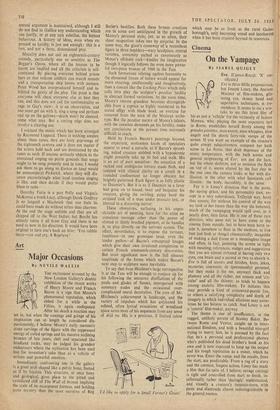Art
Major Occasions
By NEVILE WALLIS
THE excitement aroused by the New London Gallery's double exhibition of the recent works of Henry Moore and Francis Bacon is a sign that Moore's phenomenal reputation, which ebbed for a while in the Fifties, is again undisputed. After his death a reaction may set in, but when the comings and goings of his inspiration can at length be considered dis- passionately, I believe Moore's early mesmeric stone carvings of the figure with the suppressed energy of coiled springs and his massive reclining bronzes of late years, cleft and separated like headland rocks, may be judged his grandest endeavours where the stylisation has been used less for invention's sake than as a vehicle of serious and powerful emotion.
Immediately confronting one in the gallery is a great arch shaped like a pelvic bone, fretted as if by friction. This structure, at once bony and geological, gives place to the pitted and castellated cliff of The Wall of bronze implying the scale of an escarpment fortress, and bolding more mystery than the most secretive of Reg
Butler's bastilles. Both these bronze creations are in some sort anticipated in the growth of Moore's personal style; yet, as so often, their sheer magnetism takes one by surprise. In the same way, the giant's causeway of a recumbent figure in three boulders—wary headpiece, central vertebra, extremity arched as cavernously as Monet's offshore rock—kindles the imagination though it logically follows the even more power- ful two-piece bronze of 1960 in the Tate.
Such formations relating ageless humanity to the elemental forces of nature would appear far more exacting, intellectually and imaginatively, than a conceit like the Locking Piece which only calls into play the sculptor's peculiar facility in abstract formal variations. At the same time, Moore's remote grandeur becomes .distinguish- able from a caprice as highly mannered as his seated effigy with blade head, an exercise far removed from the aura of the Mexican arche- type. But the peculiar nature of Moore's talents, with the ceaseless demands on his fertility, make- any conclusions at the present time extremely difficult to reach.
Held by Francis Bacon's paintings beyond, the expectant, motionless knots of spectators appear to await a miracle, as if Bacon's sprawl- ing, naked creature stabbed with a hypodermic might presently take up its bed and walk. His is an art of pure sensation : the sensation of a racked and ambiguous torture made flesh, and isolated with clinical clarity on a couch in a rounded confinement no longer obscure but brightly patterned. Each figure is as fully plastic as Daumier's. But it is as if Daumier in a fever had gone on to knead, twist and bespatter his creature, giving the swirling, pulpy head the strained look of a man under pressure test, or blurred in a distorting mirror.
These obsessions, surfacing in his unpre- , dietable act of painting, have for the artist no conscious message other than the power of Clotted or thinly brushed pigment, as he handles it, to play directly on the nervous system. The effect, nevertheless, is to expose the torment, loneliness—in one grotesque head, even the tender pathos—of Bacon's conceptual images which give their own irrational complexion to certain French nineteenth-century discoveries. But most significant now is the full sinuous amplitude of the forms which makes Bacon's
next step to sculpture seem inevitable. .
To say that Ivon Hitchens's large retrospective is at the Tate will be enough to conjure up for hiS following the sensuous distillations of the pools and glades of Sussex, interspersed with summary nudes and the occasional over- complicated mural decoration. The core of Mr. Hitchens's achievement is landscape, and the variety of impulses which has quickened his refined, often lyrical evocations of woodland space saves most of his sequences from any sense of deia vu. His is a precious, if limited talent
'I'd like to apply for a Small Farmer's Grant.' which may be as fresh as the rural Gains- borough's, only becoming vexed and incoherent when it has been strained beyond its resources.






































 Previous page
Previous page